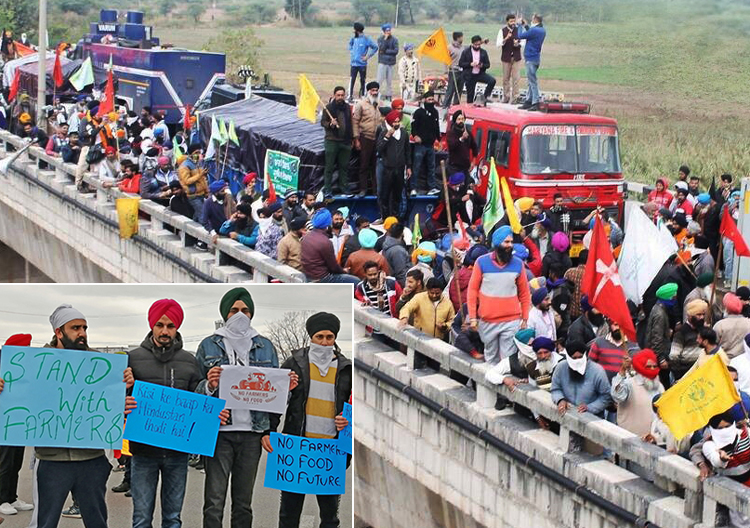A monthslong rebellion by Indian farmers, which has drawn solidarity actions from the Indian diaspora around the world, continues to intensify, shaking the government of Prime Minister Narendra Modi. Hundreds of thousands of family farmers converged on the capital, New Delhi, at the end of November, demanding repeal of new agriculture laws that threaten their livelihoods.
Many more joined a nationwide strike Dec. 8, blocking highways, rail lines and food markets for Delhi and Mumbai, home to more than 50 million people.
Modi says the new measures are to “modernize” Indian agriculture by giving farmers greater market “flexibility,” but millions of toilers on the land know they will be the ones to lose out.
The laws are a product of growing pressure from the country’s billionaire ruling families to extract greater profits from the massive agricultural workforce by ending decades-old state subsidies. Imperialist governments, including the U.S., Australia, Canada and Japan, all rival agricultural exporters, have attacked India’s price support programs.
“Our already meager profits are in danger if the government lets big businesses control prices,” Kishan Kushwaha, one protesting farmer from Haryana state, told CBS News.
After the laws passed in September, protests began uniting farmer organizations and agricultural laborers’ unions. The bills would end not only minimum price supports for working farmers but also prohibitions on hoarding, cheap government loans and subsidy payments when crops are destroyed by natural disasters.
The laws would remove government-regulated prices for crops such as rice, wheat and beans. Big corporate buyers could drive down prices of farm produce. Meanwhile, costs of farm inputs like machinery, seed and fertilizer continue to rise, crushing family farmers.
Despite police use of water cannons and barriers, some 300,000 farmers from Punjab, Haryana, Uttar Pradesh and other states set up camps for miles along five main roads to the capital, blocking traffic. Stocked with months of food, fuel and other supplies, the makeshift camps have a festive atmosphere.
Small farmers from Punjab, many of whom are Sikh, have led the way. Punjab is called the nation’s “breadbasket.” Mass protests and strikes spread to the southern states of Kerala and Karnataka as well as the northeast state of Assam and sugar farmers in Uttar Pradesh.
Family farmers, some 86% of the total in India, till plots of five acres or less. Many are being crushed by a mounting debt burden. In 2019 some 10,000 Indian farmers committed suicide.
“No farmers, no food!” is a slogan of the solidarity protests, largely by Indian immigrant workers, around the world. The largest in London drew thousands Dec. 6, reflecting the large Indian diaspora in the U.K., the former colonial power in the subcontinent. At an Oct. 4 demonstration of some 4,000 people in Southall, London — an area known as Little Punjab — British Sikhs chanted, “Long live unity between farmers and laborers” and “Save farmers.”
Hundreds have also taken to the streets in major cities across the U.S., Canada and Australia, protesting New Delhi’s attack on the farmers.
Farmers and workers solidarity
Over half of India’s 480-million strong workforce of farmers and farm laborers toil on 146 million farms passed down through generations. Half the total population of 1.35 billion depends on agriculture for a living.
India’s capitalist economy, partly due to drastic pandemic shutdowns, is in the worst recession since independence in 1947. But agricultural production grew by 3.4% in the past six months.
Tens of millions of workers, from both the private and public sector unions, held a general strike Nov. 26 against the Modi government’s new anti-union laws, which give bosses greater room to fire workers. The strike also extended support to the farmers’ march on Delhi. The All India Kisan Sangharsh Coordination Committee, a united front of over 250 farmers’ organizations, announced their support for the strikers.
Under the pressure of the protests, the government offered Dec. 5 to amend the law and keep the price support scheme for farmers. But they wouldn’t give up. They want to scrap all the laws, drawn up without consulting them.
“Future generations will remember us for the revolution we are leading,” Binod Kumar, a protesting farmer from Uttar Pradesh, told the media.


